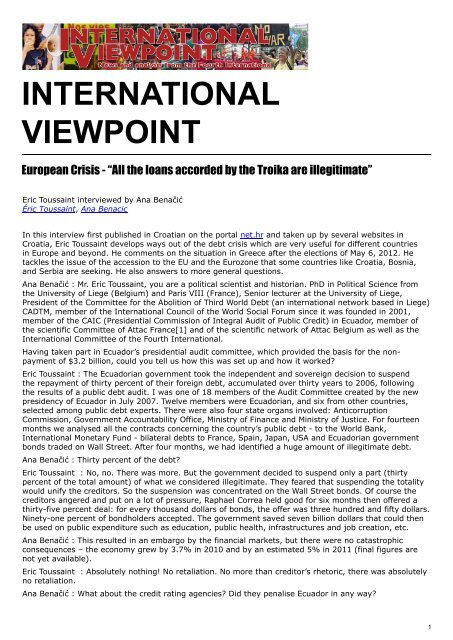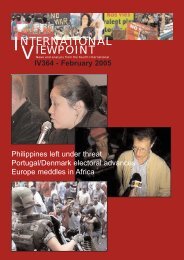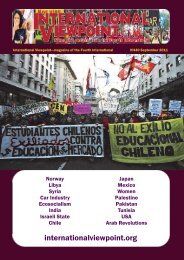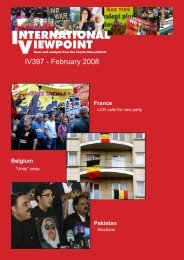Here - International Viewpoint
Here - International Viewpoint
Here - International Viewpoint
You also want an ePaper? Increase the reach of your titles
YUMPU automatically turns print PDFs into web optimized ePapers that Google loves.
INTERNATIONAL<br />
VIEWPOINT<br />
European Crisis - “All the loans accorded by the Troika are illegitimate”<br />
Eric Toussaint interviewed by Ana Benačić<br />
Éric Toussaint, Ana Benacic<br />
In this interview first published in Croatian on the portal net.hr and taken up by several websites in<br />
Croatia, Eric Toussaint develops ways out of the debt crisis which are very useful for different countries<br />
in Europe and beyond. He comments on the situation in Greece after the elections of May 6, 2012. He<br />
tackles the issue of the accession to the EU and the Eurozone that some countries like Croatia, Bosnia,<br />
and Serbia are seeking. He also answers to more general questions.<br />
Ana Benačić : Mr. Eric Toussaint, you are a political scientist and historian. PhD in Political Science from<br />
the University of Liege (Belgium) and Paris VIII (France), Senior lecturer at the University of Liege,<br />
President of the Committee for the Abolition of Third World Debt (an international network based in Liege)<br />
CADTM, member of the <strong>International</strong> Council of the World Social Forum since it was founded in 2001,<br />
member of the CAIC (Presidential Commission of Integral Audit of Public Credit) in Ecuador, member of<br />
the scientific Committee of Attac France[1] and of the scientific network of Attac Belgium as well as the<br />
<strong>International</strong> Committee of the Fourth <strong>International</strong>.<br />
Having taken part in Ecuador’s presidential audit committee, which provided the basis for the nonpayment<br />
of $3.2 billion, could you tell us how this was set up and how it worked?<br />
Eric Toussaint : The Ecuadorian government took the independent and sovereign decision to suspend<br />
the repayment of thirty percent of their foreign debt, accumulated over thirty years to 2006, following<br />
the results of a public debt audit. I was one of 18 members of the Audit Committee created by the new<br />
presidency of Ecuador in July 2007. Twelve members were Ecuadorian, and six from other countries,<br />
selected among public debt experts. There were also four state organs involved: Anticorruption<br />
Commission, Government Accountability Office, Ministry of Finance and Ministry of Justice. For fourteen<br />
months we analysed all the contracts concerning the country’s public debt - to the World Bank,<br />
<strong>International</strong> Monetary Fund - bilateral debts to France, Spain, Japan, USA and Ecuadorian government<br />
bonds traded on Wall Street. After four months, we had identified a huge amount of illegitimate debt.<br />
Ana Benačić : Thirty percent of the debt?<br />
Eric Toussaint : No, no. There was more. But the government decided to suspend only a part (thirty<br />
percent of the total amount) of what we considered illegitimate. They feared that suspending the totality<br />
would unify the creditors. So the suspension was concentrated on the Wall Street bonds. Of course the<br />
creditors angered and put on a lot of pressure, Raphael Correa held good for six months then offered a<br />
thirty-five percent deal: for every thousand dollars of bonds, the offer was three hundred and fifty dollars.<br />
Ninety-one percent of bondholders accepted. The government saved seven billion dollars that could then<br />
be used on public expenditure such as education, public health, infrastructures and job creation, etc.<br />
Ana Benačić : This resulted in an embargo by the financial markets, but there were no catastrophic<br />
consequences – the economy grew by 3.7% in 2010 and by an estimated 5% in 2011 (final figures are<br />
not yet available).<br />
Eric Toussaint : Absolutely nothing! No retaliation. No more than creditor’s rhetoric, there was absolutely<br />
no retaliation.<br />
Ana Benačić : What about the credit rating agencies? Did they penalise Ecuador in any way?<br />
1









